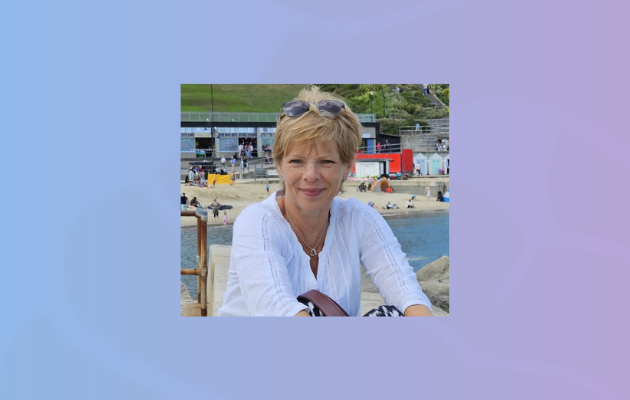Meet Helen Griffiths
Dr Helen Griffiths is currently an Advanced Clinical Endoscopist, Decontamination and VCJD advisor to the BSG and incoming JAG Lead Nurse.
What attracted you to a career in gastroenterology/endoscopy?
Following a career break to raise my children, I took up two part time jobs, both 9 hours a week, one in endoscopy and one in our local hospice. I loved both and decided that whoever offered me more hours first was where I would go. If I am honest, at that time I was focused on being a mother and maintaining my registration and not on a career path per se. However, I very soon developed a passion for the speciality, the diversity of caring for patients with acute and chronic illness, coupled with the growing technical skills of endoscopy. Specialist nursing and nurse endoscopists were emerging within the speciality and forging a career within endoscopy and gastroenterology became increasingly possible. I was incredibly lucky to have the support and mentorship of our then sole consultant gastroenterologist, Mike Hall. His recognition of my enthusiasm in the specialty and belief in my abilities enabled me to progress my career from endoscopy nurse through to nurse consultant and clinical endoscopist. We set up a nurse-led iron deficiency anaemia service which at the time was innovative, and through that I won the Nursing Standard Gastroenterology Nurse of the Year Award in 2002. This opened many doors including helping to set up what is now the gastrointestinal nursing journal. In turn, this ignited a passion for teaching and lecturing and I have been fortunate to speak at conferences across Europe, Australia, New Zealand, the Middle East, and South Africa, and have published widely.
In addition to work within my local trust, I was seconded part time as a national nurse advisor to the English BCSP and have worked within JAG in a number of assessor and leadership roles. These have meant that I have been able to contribute to and influence service development, nurse training and education and quality and safety within the speciality.
My career has certainly been diverse, but I suspect now my name is better known as the decontamination and VCJD advisor for the BSG. This was a role that I took up 10 years ago and will probably have until I die. In the early days, I was invisible around the endoscopy committee table and colleagues would nod when I delivered my report on the development of training and education, advancement of safe practice, contribution to guidance publications in the UK and on the world stage, and the questions and queries that came to me through the BSG. Then came the clusters of Carbapenemase Resistant Enterococci (CRE) infections associated with contaminated duodenoscopes in 2015, the pandemic, and now the green agenda. It appears that I cannot hide at the back anymore!
What advancement in gastroenterology/hepatology are you most excited about and why?
I am an ‘old dog’ now but I am excited to see the growth of the training academies and hopeful that the recently published NHS long term workforce plan is more than just words. The growth of practice educators within endoscopy to support and help retain the nursing and AHP workforce is a great addition and I hope that they too will be supported within the overall workforce plan.
What do you enjoy most about your work?
I enjoy the patient facing aspect of my role and the care and compassion of nursing. I thoroughly enjoy the service development role, the education and training to nurture the new workforce, and ensuring that quality and safety standards are embedded and maintained in all services. I am certainly proud to be part of such a great community.
What is the one thing you would change?
Personally, time! Despite 43 years in nursing, I don’t feel that I have had enough. From a speciality perspective, I have often wondered if we should have focused on training, quality, and safety sooner. Hindsight is a wonderful thing, but we didn’t know what we didn’t know and if we did would services have been ready? The digital age has certainly accelerated service improvement and development. Allowing us to network, communicate, collect data, share good practice, and highlight underperformance more rapidly with ease.
What’s the best advice you’ve been given in your career?
It was advice given to me when I first became a clinical nurse specialist by one of the first colorectal clinical nurse specialists in the country, Jane Winney. She said “If they close the door on you Helen, just go through the window”. Jane started up the stoma care service at the then Hereford Hospital in 1982, in a linen cupboard. She had to fight long and hard for the recognition as a specialist, pushing the boundaries of nursing practice to achieve autonomy. I was also finding the same battle as I commenced nurse endoscopist training. In the early days, there was push back and scepticism from colleagues both medical and nursing at this advancing practice. Something that we now take for granted. I have had to climb through many windows in my career.
What does being a BSG member mean to you?
For me, it is the opportunity to grow, learn, retain my enthusiasm, and be inspired by the amazing colleagues around me. The joint working and improved inclusion of nurses and allied health professionals within the BSG has meant a better experience as a member, with a valued voice and opinion. We are not 100% there yet, but I hope that colleagues recognise the work taken to get nurses a place at the table and keep that place by becoming BSG members and using their voice and experience to showcase their contribution within the speciality and within nursing. The suffragettes worked tirelessly to get women the vote. It is a waste if women then don’t vote.
If you are interested in taking part in our Meet our Members initiative, please contact the BSG Communications team.
